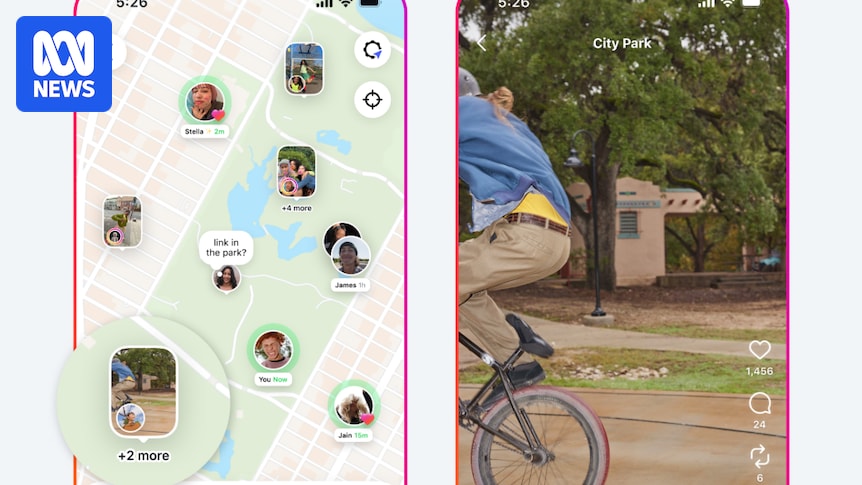Instagram’s new location-sharing feature is drawing criticism for potentially sharing users’ whereabouts without their knowledge.
The recent update, which Meta announced as rolling out in the US on August 6, allows users to see content their friends and favourite creators are posting from specific locations.
Though Meta says the feature is off by default, some users claim they were shocked to find their location had been shared without their knowledge, prompting viral warnings online.
“Mine was turned on and my home address was showing for all of my followers to see,” user Lindsey Bell commented under a TikTok video posted by reality TV star Kelley Flanagan.
“Turned it off immediately once I knew, but had me feeling absolutely sick about it.”
Some users have pointed out how the new feature could be deemed unsafe. (Supplied: Meta)
In her video, Flanagan called the new feature “dangerous” and shared step-by-step instructions on how to disable it.
What is Instagram’s new location feature?
On Wednesday, Instagram launched a new feature allowing users to share their location through an in-app map.
The release statement said it is one of “several new ways to help you better connect with your friends on Instagram”.
The update is opt-in, meaning that users have to elect to use the new feature, otherwise it is turned off, which Instagram chief Adam Mosseri was quick to point out after the backlash online.
“Quick Friend Map clarification, your location will only be shared if you decide to share it, and if you do, it can only be shared with a limited group of people you choose,” Mr Mosseri wrote online.
“To start, location sharing is completely off.”
Head of Instagram Adam Mosseri. (Getty: Drew Angerer)
According to Meta, if you choose to use location sharing, “your location is updated whenever you open the app or return to the app if it’s been running in the background”.
For parents with app supervision set up for their children, Instagram says you “will receive a notification if your teen starts sharing their location”.
The social media app said this will give parents “the opportunity to have important conversations about how to safely share with friends”.
Location-sharing linked to coercive control
Research from the eSafety Commission has linked location-sharing features to a higher risk of tech-based coercive control.
Tech-based coercive control is defined as a pattern of behaviour where digital tools are used to monitor, manipulate, or intimidate a partner or ex-partner.
Research shows location-sharing apps increase risk of coercive control
The 2024 report found that many young adults have normalised tech-based coercive control in intimate partner relationships, with nearly one in five believing it’s reasonable to track a partner’s location.
“Young people have become so accustomed to a certain level of online tracking and monitoring by family and friends that it wouldn’t seem strange to expect similar digital access in a romantic relationship,” said eSafety Commissioner Julie Inman Grant in a statement.
“It isn’t an exaggeration to say preventing tech-based coercive control, and the attitudes that condone it, can save lives.”
Family and domestic violence support services:Loading…Not Instagram’s first privacy controversy
The latest backlash comes just a week after a federal jury in San Francisco sided with women who accused Meta of exploiting health data.
The lawsuit alleged that Meta exploited sensitive health information collected through the Flo app, a menstruation and family planning tracker, to target users with advertising.
A jury found that Meta used women’s sensitive health data to better target users with advertising, according to law firm Labaton Keller Sucharow, which represented the plaintiffs.
Evidence at trial showed Meta knowingly received confidential health data from the third-party app, and that some employees appeared to mock the nature of the information.
“This case was about more than just data … it was about dignity, trust, and accountability,” said lead attorney Carol Villegas in a blog post.
Damages in the suit have yet to be determined.
ABC/AFP

